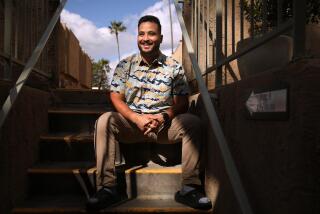Former Oklahoma Player Says He Used, Sold Cocaine
- Share via
AUSTIN, Tex. — A former University of Oklahoma football player has disclosed in sworn testimony that he used and sold cocaine while playing for the Sooners under former coach Barry Switzer.
In a deposition, taken as part of a reporter’s libel suit over Switzer’s best-selling autobiography, “Bootlegger’s Boy,” former Oklahoma linebacker Brad McBride said he had used cocaine and had sold the drug while playing for the Sooners between 1984 and 1987.
McBride also said in the deposition that he had acquired game tickets from teammates and sold them for a profit, an apparent violation of NCAA rules that was not uncovered by the NCAA in an investigation that culminated with the Sooners being placed on probation in 1988.
Switzer resigned at Oklahoma in June of 1989, after a series of criminal incidents involving Oklahoma players, including the arrest of quarterback Charles Thompson on a charge of selling cocaine.
Both Switzer and McBride declined to be interviewed by The Times.
A former Dallas Times Herald reporter, Jack Taylor, has filed suit in state district court here, seeking an unspecified amount for damages allegedly caused by Switzer’s book. Switzer alleges that Taylor participated in an ill-fated scheme to trap a member of the Oklahoma football team in a cocaine sting at the 1988 Orange Bowl.
In the book, the player is identified only as “Big Red.” However, court records identify the player as McBride, a four-year letterman for the Sooners as a backup linebacker.
McBride, a former roommate of controversial ex-Sooner star Brian Bosworth, discussed his drug use as part of a deposition taken in July. A copy of the deposition was obtained by The Times.
McBride testified that he had used cocaine while playing at Oklahoma and occasionally had sold the drug to “friends” who weren’t members of the Oklahoma football team. He stated that he had transported an unspecified quantity of cocaine from Miami to Oklahoma for his own use after the Sooners played in the 1987 Orange Bowl.
McBride testified that he twice tested positive in school-administered drug tests and underwent counseling.
“It’s not something I’m proud of, but . . . it is behind me,” he said of his drug use in the deposition.
McBride also testified that he had acquired game tickets from teammates and sold them for a profit during the 1987 season. In the deposition, McBride said at least four other former Sooner players were part of the scheme.
McBride did not provide details of the scheme but indicated that he had sold student tickets to non-students by affixing special stickers to the tickets.
NCAA rules state that a student-athlete may not buy tickets for an athletic contest and resell the tickets at a price greater than their face value.
Although the ticket-selling scheme described by McBride was not uncovered by the NCAA in its investigation of the Oklahoma program, which began in 1986 and concluded in ‘88, the matter is not likely to be of interest to the NCAA now.
According to Rich Hilliard, an NCAA enforcement director, the NCAA generally does not pursue allegations of rules violations that surface after a case has been closed unless the alleged violations are considerably more serious than those already cited by the NCAA or appear to have occurred after the case was processed.
In putting Oklahoma on three years’ probation in December of 1988, the NCAA found that an athletic department staff member had provided cash to several players in exchange for game tickets.
More to Read
Go beyond the scoreboard
Get the latest on L.A.'s teams in the daily Sports Report newsletter.
You may occasionally receive promotional content from the Los Angeles Times.










